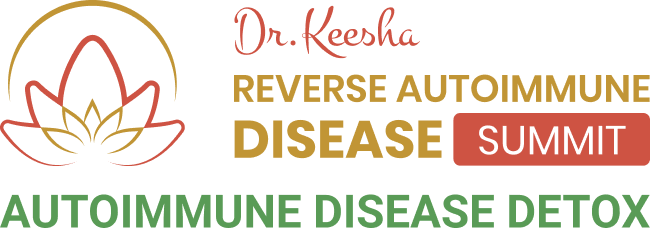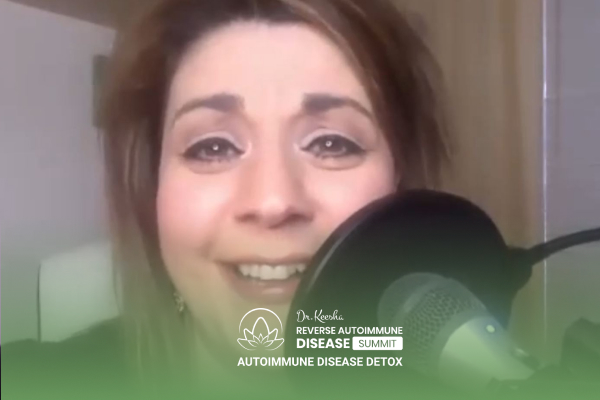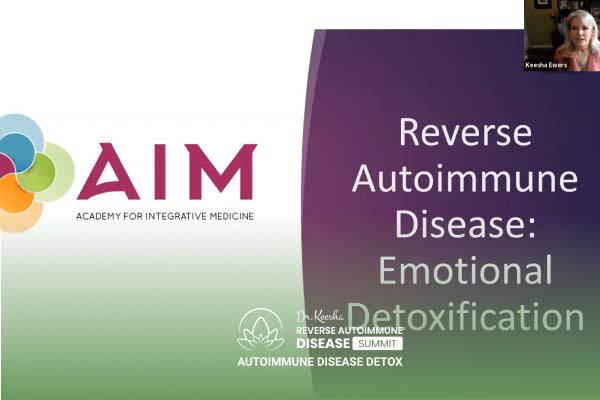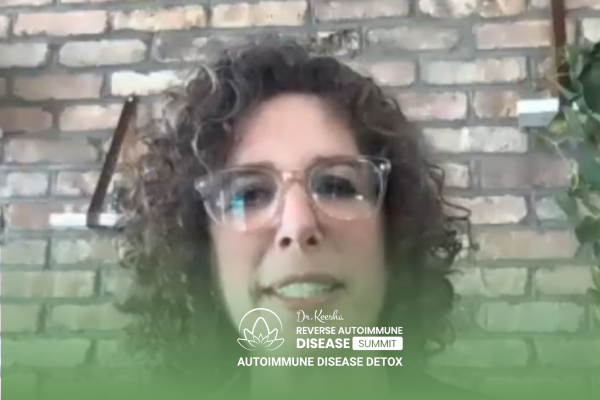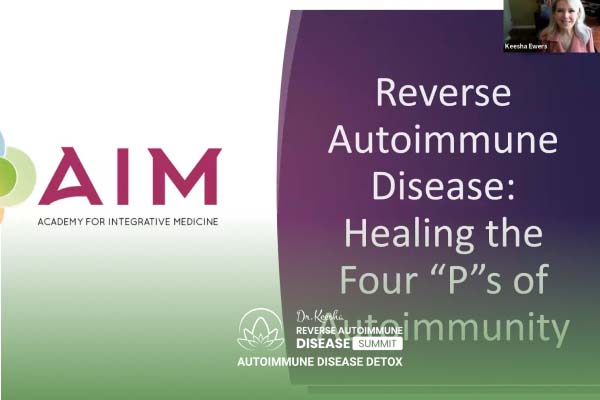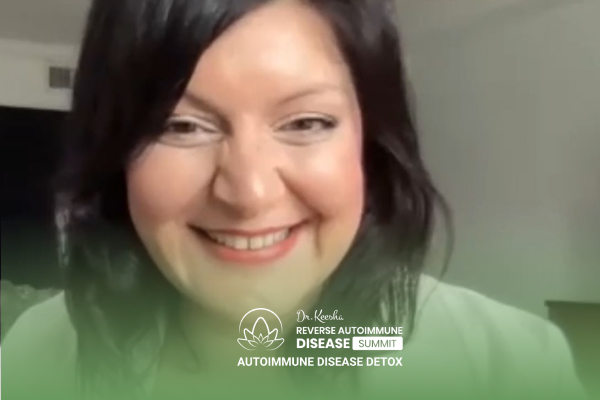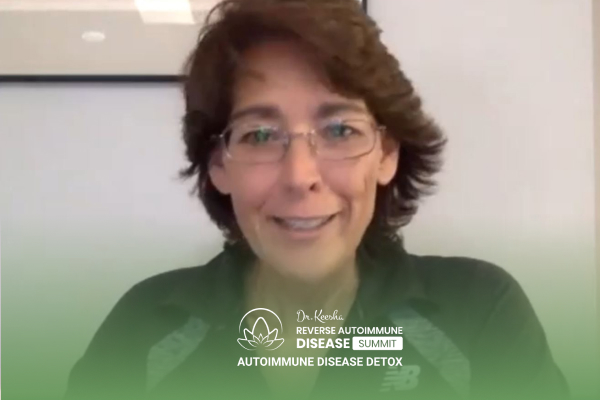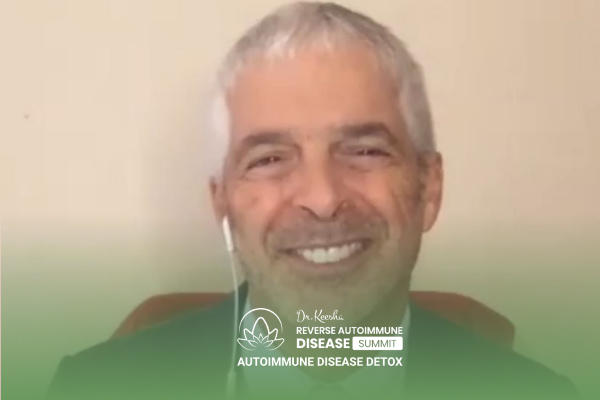Join the discussion below
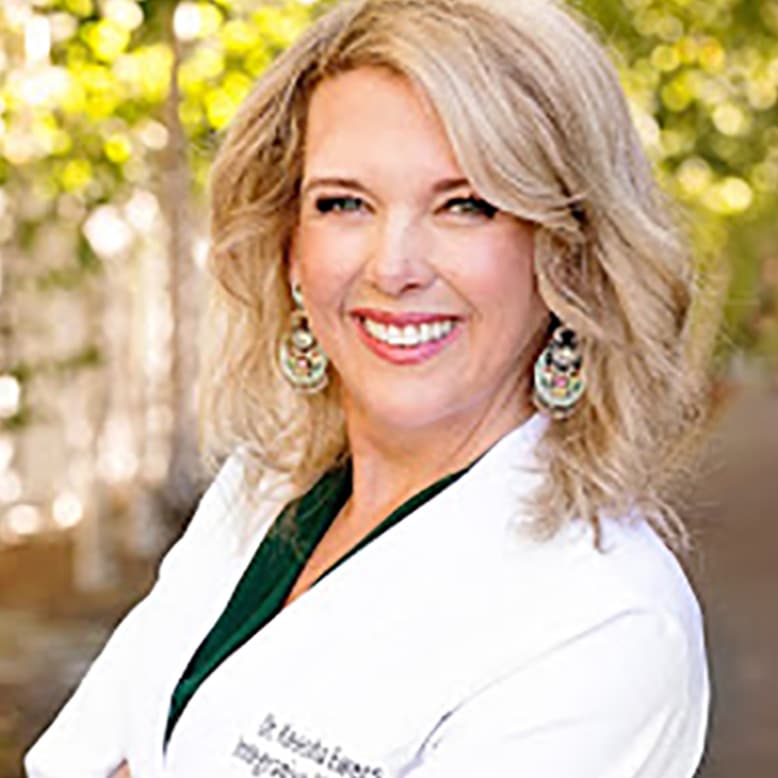
Keesha Ewers, PhD, ARNP-FNP-C, AAP, IFM-C
Dr. Keesha Ewers is an integrative medicine expert, Doctor of Sexology, Family Practice ARNP, Psychotherapist, herbalist, is board certified in functional medicine and Ayurvedic medicine, and is the founder and medical director of the Academy for Integrative Medicine Health Coach Certification Program. Dr. Keesha has been in the medical field... Read More
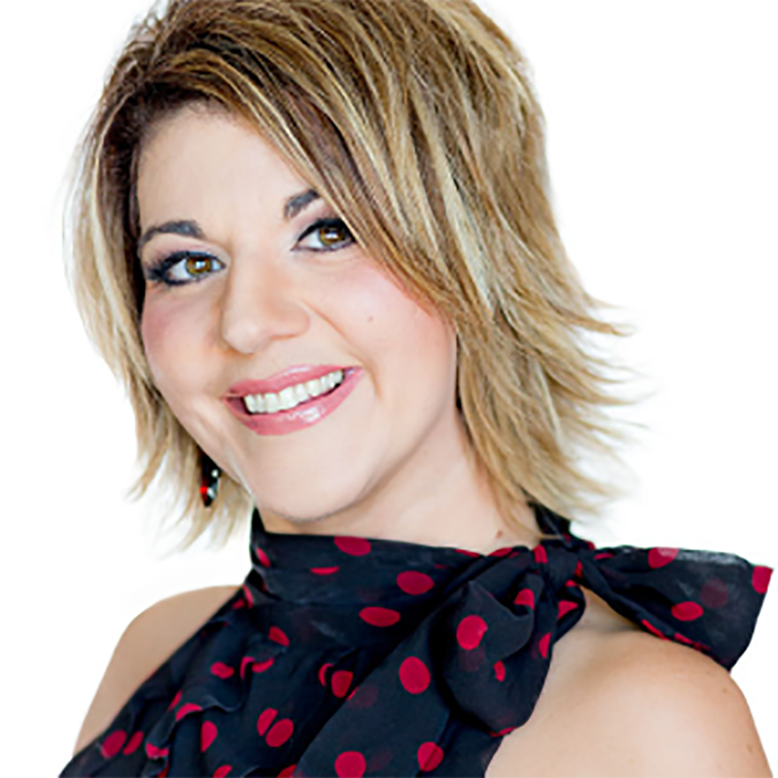
Misty Williams spent years struggling to reclaim her health and vitality after a brain fog and fatigue tailspin from life-threatening complications from surgery to remove an ovarian cyst. Afterward, her doctor told her she had endometriosis, the only remedies were drugs and surgery, her labs were “normal” and she could... Read More
- The life-shifting diagnosis that made Misty reconsider her entire life
- Why sleep is so essential for reversing autoimmunity
- How to become an expert sleeper (even if you live for that 2 am TV time)
Keesha Ewers, PhD, ARNP-FNP-C, AAP, IFM-C
Welcome to The Reverse Auto Immune Disease Summit, everybody. I’m Dr. Keesha. You are joining me for the fourth iteration of The Reverse Auto Immune Disease Summit. We’re talking about auto-immune detox at this one. And I am just really delighted to introduce you to Missy Williams. If you have not met her yet, she is delightful. She spent years struggling to reclaim her health and vitality after your a fog and fatigue tailspin from life-threatening complications from surgery to remove an ovarian cyst. Afterward, her doctor told her that she had endometriosis. The only remedies were drugs and surgery, and her labs were normal. And she could Google to learn more about what was happening to her body. Probably some of you have had an experience similar to this. I know that I did too. Except we didn’t have Google when I did it. It was Ask Jeeves. At 35 years old, Misty started fighting for her quality of life, enduring more challenges on her road to healing, including an unexplained 45 pound weight gain, debilitating brain fog, fatigue, hypothyroidism, and premature ovarian failure. She founded healingrosie.com to provide high performing women with the resources and the community to successfully confront the unexpected chronic health issues that women often experience as they age. Welcome to the summit, Misty.
Misty Williams
Thank you. I’m so happy to be here.
Keesha Ewers, PhD, ARNP-FNP-C, AAP, IFM-C
We’re going to be talking about, there’s this really interesting thing that happens when I’m working with my patients and even my students. It’s really sort of comical even . And it’s, there are some pillars to good health and to helping us reverse chronic illness. And one of those is hydration. Another one is exercise. Another one is eating according to what your body’s asking you for, from testing you’ve done for genetics and food sensitivities. Another one is sleep. And those four things, people tend to just kind of zone out. They hear them so often. Another one is your relationship to stress. And people will hear these things and they’ll just kind of cross their eyes and go, “Well, don’t you have a supplement I can take?” If they’re a little more elevated, otherwise it’s gonna have a prescription for sleep.
And this kind of zoning out and eyes crossing is because we hear it all the time that there are these kind of five main things that will help us to sustain our health and reverse disease. But they’re kind of hard. They’re all ones that you have to take responsibility in yourself for. There’s no magic wand. And there’s nobody that can actually say this will 100% change your life. It’s all really up to you and how to figure out your lifestyle choices and implement them according to your individual constitution. So sleep, let’s talk about sleep in this one. It’s one of those that I hear all the time. “Yeah, yeah, yeah, yeah.” When I say, “Okay, so do you go to bed by 10 and get up at six?” “No. When the kids go to bed or after dinner, I stay up until two or three o’clock in the morning because that’s when it’s quiet. That’s when I can do my job. I get all this stuff done. And then I have coffee to wake myself up in the morning and I have an alcohol to put myself back to sleep at night.” Well, that’s not a good roller coaster, is it?
Misty Williams
Yeah, I mean, I relate to the people that like to stay up until two. That was my life. I was a chronic night owl from 18 until 35 when everything started spinning out of control for me. I never went to bed before 2:00 AM. Weeknights, weekends, I would get a second wind around 9:00 PM. And that was super valuable time to me. That was like five hours of productivity.
Keesha Ewers, PhD, ARNP-FNP-C, AAP, IFM-C
I know. I know. I was that person, too.
Misty Williams
I relate. I relate. Yep. But I think once you’re confronted with the needs of your body and your body breaking down, you have to have a come to Jesus with yourself, you know? Like what’s really going on here? And that’s what happened for me after I walked out of my OB-GYN office after the surgery and complication and going 144 hours without sleep after the second surgery. It was like torture. I reached out to a friend of mine who was a chiropractor and he started doing some work with me. And the first thing he asked me is, “How is your sleep?” And I didn’t know that there was anything wrong with my sleep. I thought my sleep was fine. He asked me how I woke up in the morning. And I was like, “Well, I feel like I’ve been hit by a Mack truck because I’ve been sleeping all night.” And he was like, “No, that’s not why you feel like you’ve been hit by a Mack truck when you wake up.”
Keesha Ewers, PhD, ARNP-FNP-C, AAP, IFM-C
And no, that isn’t normal. I mean, I thought it was normal.
Misty Williams
Yeah, I totally thought it was normal. I was sleeping. I’m tired from waking up because I was sleeping. It makes perfect sense.
Keesha Ewers, PhD, ARNP-FNP-C, AAP, IFM-C
I had my tonsils out at the age of 22. And instead of staying in bed like I was told to, I wallpapered my kitchen. I stayed up until like two o’clock in the morning and then was surprised that it took me so long to recover. I had all this time off of work, like why not use it?
Misty Williams
We really do look at sleep as like this interruption rather than like this hugely important part of why we function well in the world. And I had to really change my perspective and it was hard. Listen, whenever I lose four hours of good productivity in my day, that doesn’t, you can’t do that and not have it ripple effect. Everything in my life had to be rethought and reconsidered, but dialing in my sleep was really the foundational thing that allowed me to start experiencing some healing. And we get stuck in these patterns of like, we’re trying these different protocols, we’re getting these diagnoses, things don’t seem to be getting better, the protocols don’t seem to work, sleep gets harder. It’s harder to fall asleep, so we’re getting less sleep, and this just layers and stacks over time.
So I think coming to acceptance that this is a hugely important part of good health. Like I’m 45 years old, I actually had to think about that. How old am I? I’m 45 years old. And I love my vitality and I want energy like this until the day I die. And so if I want to create that for myself, I know what it takes. And at one time it seemed like a sacrifice, but now it’s just a gift. Like I, everyone in my life knows. And it’s been like this for years, that sleep to me is the most important thing I do for myself. I love people. I love networking before COVID. I went to events all the time. I have a big community here in Austin and I love it. And 9:30, 10 o’clock Misty’s going home and climbing into bed . That’s just the way that I roll, but we all have to first just kind of have a little meeting with ourselves and this is not an optional thing. There’s not a way to get away with not sleeping. And if you’re not sleeping, you’re not healing. And we spend all this money on doctors and protocols and supplements, and we want it to work, but if our body doesn’t have the opportunity to repair and restore and heal, nothing is going to work. So yeah, I’m very passionate about this topic.
Keesha Ewers, PhD, ARNP-FNP-C, AAP, IFM-C
And you did a summit about it. I was a guest on it.
Misty Williams
I did. And we’re doing it again.
Keesha Ewers, PhD, ARNP-FNP-C, AAP, IFM-C
And I’d loved to hear what your gleanings are from the summit. One of the things I love about running summits is I learn so much from the people that I have on.
Misty Williams
Yeah. Well, I think my, a foundational thing with sleep, I actually didn’t learn from my summit, but it’s really, really important. We should talk about it. I learned it in the early days, like 2011 and ’12 is early days in my journey, from Dave Asprey and Ben Greenfield and probably I’m sure Robb Wolf, a lot of people in the paleo space were talking about circadian biology. And this idea that cycles of light really are the foundational control for all of life on our planet. And light cycles have a tremendous effect on our body’s ability to sleep. And our ancestors, when the sun went down, they didn’t have electricity. For a while, they didn’t even have fire. Light sources were really minimal after dark, and they went to sleep. And then when the sun comes up, they wake up, and it kept them aligned with how our bodies are designed to work. All of our cells are designed to take their signal from our environment and the light in our environment.
So when I was studying about this early on, because I knew I had trouble with my sleep, I learned about amber glasses, lowering the lights in your home, putting amber bulbs in your lamps, no devices late at night, just doing things to help your body actually move into being able to sleep. And in fact, the amber glasses, which you can get on Amazon y’all for like 10 or 15 bucks, the amber glasses is a really common thing that I recommend to people who ask me about health in my friend circle. And we’re at 100% over the years. No one has ever tried amber glasses and been like, “It doesn’t work.” I always get feedback within days of them getting the glasses because it’s fast. It really helps your body to move into sleep.
You have receptors in your eye that communicate with the brain when it picks up on blue light that it’s daytime. So that stimulates all your sympathetic nervous system. So when those blue light rays are filtered out, your body can move into parasympathetic. And it just makes everything related to sleep happen a lot easier. And all this signaling in the body related to your hormones and neurotransmitters that need to get lined up to help you fall asleep, they’re able to do their job, and you’re not waiting until it’s time to drop into bed to figure out how to get yourself to sleep. So that, to me, is so foundational. I can share a lot of the other things, and I will, a lot of the other things that I’ve learned about sleep.
Keesha Ewers, PhD, ARNP-FNP-C, AAP, IFM-C
Let’s start there with the blue light piece because one of the things I often think of, too, is when is the time when we were really able to rest and be at ease was in the womb. And so, often, sometimes, not if you didn’t have a mom that was at rest and at ease, but we felt like really nourished and enclosed and in that beautiful saltwater. And so I always tell my patients, instead of rushing, rushing, rushing all day long and then crashing into bed and expecting your body to get the signal like, okay now sleep, sleep, instead of crashing into sleep, instead, the hour before, start turning off everything. And then at least a half an hour before, get into a salt bath with maybe some lavender in it and soak with candles around it. ‘Cause it also gives that other light. And then you don’t sit and look at a screen while you’re in the tub. Maybe listen to some music that is really gentle. I love Encore, things like that, “Ave Maria,” like very sacred music. And I love doing that. And what it does is it signals everything, “Oh, I’m safe. I’m at ease, and it’s time to go to sleep.” ‘Cause if you don’t feel safe, you’re also not allowed to sleep.
Misty Williams
Yeah.
Keesha Ewers, PhD, ARNP-FNP-C, AAP, IFM-C
Right? A zebra being chased by a lion knows it can’t get up and go to the bathroom, can’t have sex, and cannot sleep.
Misty Williams
We live in, the Western world is very performance and productivity oriented. And I think there’s something deep inside of us that feels like to be worthy of, insert whatever it is you wanna be worthy of, love, attention, abundance, fill in the blanks, to be worthy, we need to be doing. We need to accomplish. And that fundamental underlying belief that a lot of us don’t really tune into until we start getting older and really being forced, a lot of times, by our bodies to examine the way we’re living our lives, that belief keeps us from doing the things that actually nurture and nourish us. When I, my journey, there’s almost kind of a demarcation point in the middle for me of the last 10 years or so of my own healing journey where I realized around two, three, four years in that there was fundamentally a part of the way that I was showing up in the world that wasn’t serving me. And it was really tied to this belief that I was unworthy of support.
I was unworthy of being nurtured. I was unworthy of receiving. I had been conditioned to be the giver and the doer and my value came from that. My identity came from that. And so I was always in that mode of depleting myself, basically, and really learning to shift that energy so that I could welcome in what I needed and feel worthy of that support, understand deeply that this universal law of giver and receiver is crucial to energy being able to flow properly in your life. That’s been a big, big part of my journey, too. That has helped me to realize that there’s things I have to give myself if I wanna be at my best and have something to give the world. So we can talk bio hacks, but you need to pay attention to what’s really going on inside and what’s really keeping you from doing the thing that you know you need to do to honor who you are and what your body needs.
Keesha Ewers, PhD, ARNP-FNP-C, AAP, IFM-C
I agree 100%. Let’s talk about the different kinds of sleep disruption patterns people have. ‘Cause some people can fall asleep easily but they don’t stay asleep. Some people have a hard time falling asleep and can’t stay asleep. And then some people can fall asleep, right, et cetera, et cetera. Right?
Misty Williams
Right.
Keesha Ewers, PhD, ARNP-FNP-C, AAP, IFM-C
And so I noticed, in my own journey, I’m 55 now, and I’ve always been a really good sleeper. That has never been a problem for me. I do go to bed at 10. I’ve always said I’m a pumpkin past 12 o’clock. So, and that was after I got diagnosed with rheumatoid arthritis. In my twenties, I was not. I was a night owl. So, once I got diagnosed with an autoimmune disease and I realized the importance of sleep, I was like, okay. I went to bed by 10, up by six. And then I was productive all day long. And then I would give myself that cushion between, “Okay body, I love you. I appreciate you. I’m gonna give you what you need. Here’s your signal for how to go to sleep.” But then I entered into perimenopause and menopause-
Misty Williams
And all bets are off .
Keesha Ewers, PhD, ARNP-FNP-C, AAP, IFM-C
Then I go into menopause and I do what I call the burrito roll, roll out of the covers, roll into the covers, roll out of the covers, roll into the covers, all night long. And my sleep is not as like hit. Usually, I can still hit the pillow and go to sleep, but then I’ll wake up warm. And so hormones are a big piece of that.
Misty Williams
Big, big, big.
Keesha Ewers, PhD, ARNP-FNP-C, AAP, IFM-C
Big piece of it. So I just wanna point that point out to people that when we talk about sleep, I am understanding the nuances and the different kinds of sleep patterns that can be disrupted. So I wanna kind of start with that understanding and then, Misty, I want you to take it from there about like where you wanna go with it. But just, we have these problems of, for people that, I think, people that struggle to fall asleep often, it’s brain that won’t turn off.
Misty Williams
That’s right. Yeah. If you’re having trouble falling asleep, most likely it’s a circadian issue. And it’s a how you’re managing your life issue. Now, clearly some people end up having deeper issues caused by our HPA axis being really out of whack and lots of gut issues where you’re just not making the sleep hormones that you need. But even a lot, like to get to that point, you have to have perpetually had a lot of bad habits. So trouble falling asleep, first, you’ve got to fix all the circadian stuff, and you’ve gotta create that nighttime routine to help you wind down and get ready for bed. And the tips that I’ve tried myself and seen lots of success with and I hear about it from our community are room darkening curtains. And we talk about this a lot in the summit, too, room darkening curtains.
That’s a newer one for me. I just got room darkening curtains last year. And it’s like, astonishing the difference it makes in your sleep. And I thought my sleep was great before, but it was like another level. So blocking that light completely. So you hold your hand up in front of your face and you don’t see it. That’s how you know it’s truly dark in your room. That can be really helpful in both falling asleep and staying asleep. Cold is really helpful. I have a ChiliPAD. And then I’m covered like, right now, it’s winter for us and so we have a weighted blanket which is also amazing for helping with sleep, especially if you deal a lot with anxiety. I hear from a lot of women in our community that weighted blankets really help them if they’ve got anxiety issues. But weighted blanket and a down comforter both.
We cuddle up , but there’s still this coolness. Both of those things help tremendously, but I’ve dealt with all the hormone issues. I had mercury filling improperly drilled for my teeth in 2013 that basically triggered a 45 pound weight gain and completely crashed all my hormones. Before that, I lost my ovary, had endometriosis. So I’ve just had lots of hormone challenges. And when I’m not on a really nicely optimized hormone regimen, I don’t sleep worth crap. So I have to have progesterone. But for me, I noticed the biggest difference with estrogen. I actually recently did an experiment with my doctor raising my estrogen levels, and I went from getting about an hour to an hour and a half of deep sleep a night to four hours of deep sleep. Very, very significant difference just with optimizing my estrogen, pushing it a little bit further to see how my body responded-
Keesha Ewers, PhD, ARNP-FNP-C, AAP, IFM-C
I just lathered mine on before our talk. Yeah.
Misty Williams
Say that again.
Keesha Ewers, PhD, ARNP-FNP-C, AAP, IFM-C
I just lathered mine on before our talk. Bioidentical hormone replacement definitely-
Misty Williams
I’ve really needed it. Therapeutically, I’ve needed it. Because I actually had some things crush me. But for a lots of women, as they move into menopause, my little sister just reached out to me, “Do you get night sweats?” She’s five years younger than me. “Are you getting night sweats at night?” Which fortunately, bioidentical hormone replacement therapy keeps me from having night sweats, but it’s, I’m miserable.
Keesha Ewers, PhD, ARNP-FNP-C, AAP, IFM-C
I’ve never had a night sweat, but I get warm and that’s the burrito roll.
Misty Williams
Yeah, totally. I get miserable when I’m like putting off a lot of heat. So I’m a big fan of optimizing too, but you know, Keesha, this is a detox summit, and I have to say, doing heavy metal detoxification for me has been a significant needle mover for all of my markers, including helping me to improve my sleep.
Keesha Ewers, PhD, ARNP-FNP-C, AAP, IFM-C
Let’s put in a little gray box in our discussion about that just for our listeners and viewers to understand is if you have adrenal fatigue and a hormone imbalance, you don’t do heavy metal chelation. So I just wanna say this because it’s really important. Heavy metal chelation, I do that with my patients all the time, but I say there’s always a right order. You do not go after heavy metals or mycotoxins or any of the other big things that we wanna kill off like yeast and SIBO and things like that until your adrenals and hormones are stable to a point where your body can handle it because it’s really hard work for your body.
Misty Williams
It is hard work.
Keesha Ewers, PhD, ARNP-FNP-C, AAP, IFM-C
So you need to have gas in the tank. Otherwise, it will take you further below your baseline, which is no fun. If you are in detox from heavy metals and you’re already empty, then you’re going to have all kinds of bad side effects from it that you don’t need to have. My patients, when I detox them, actually skate through it pretty easily getting rid of metals. And it’s because I’ve gotten them ready for it before we go after them. So that’s really important.
Misty Williams
Detoxification requires excellent sleep. So if you don’t have your sleep relatively dialed in, detoxification will be absolutely brutal for you. Because you need you, your body needs, the time that it’s gonna go pull the metals out is when you’re sleeping. And if you’re not getting good sleep, especially getting some good deep sleep, then yes, it will be very taxing for you. It’s interesting how, I look back over the tapestry of the last 10 years and there’s so many layers even to the sleep conversation of what’s helped me to dial my sleep in. And so, and I’ve tried a few different things that have been helpful. A melatonin supplement at times when I’ve really struggled with sleep has helped, but then there’s times I’ve taken melatonin and it’s good for the first hour and then I’m waking up again.
Keesha Ewers, PhD, ARNP-FNP-C, AAP, IFM-C
The Dutch test that I run on people actually tells us if you have enough melatonin. So it’s like Goldilocks, you don’t want too much and you don’t want too little. That’s why sometimes it works and sometimes it doesn’t. It’s because sometimes you need it and other times you don’t. So it’s really good to know that level before you start taking things like that. Because it could be that your cortisol is zinging up at night, and then it’s not a melatonin issue. It’s phosphatidylserine that you need to be using. And so it’s like, you can actually do more harm than good just trying things. Yeah.
Misty Williams
The thing that I tend to be a fan of for waking up a lot in the night is CBD. CBD, basically glossed that over a couple of years ago when I was switching from one type of hormone replacement therapy to another, which is brutal . And I was dealing with a lot of waking up in the night. My whole body was like, what is happening right now? A CBD supplement was really helpful to me. I’d wake up, and I can kinda feel the difference in a wake up, you’re rolling over, and I wake up, “Oh my gosh, I’m gonna be awake.” You know? And CBD worked really well for me, but I would, I did, on my recent Dutch test, my melatonin was like so high and all my other hormones are, I’m on every supplement you can imagine for hormones, they’re all pretty tanked without supplements. With my supplements, I’m in a good space. But my melatonin is super high. And we really credit that to all the lifestyle stuff. My body at least knows how to do that one right. And that comes back to the circadian thing. That’s why it’s really my favorite.
Keesha Ewers, PhD, ARNP-FNP-C, AAP, IFM-C
Well, it’s pineal glands. So if you’re wearing amber glasses and you’re not doing screens up late at night, your pineal gland can do its job.
Misty Williams
That’s right. That’s right. There’s some really interesting research out there, too, if anyone kind of resonates with the pineal gland idea, on what causes your pineal gland to calcify as you get older and things that you can do to decalcify. For a lot of people who struggle with chronic health issues, I suspect there’s probably some calcification of the pineal gland going on. And there’s definitely things that you can do to-
Keesha Ewers, PhD, ARNP-FNP-C, AAP, IFM-C
It’s considered your spiritual center. So people that are engaged actively in spiritual practices tend not to get calcification as they age. Because you’re actually engaging it constantly.
Misty Williams
One of the things I wanna-
Keesha Ewers, PhD, ARNP-FNP-C, AAP, IFM-C
Do those practices, meditation, prayer, like all these things are part of the pineal gland. Yeah.
Misty Williams
One of the things I wanna mention about melatonin kinda tying to the room darkening curtains ’cause I found it fascinating. I was interviewing Dr. Ann Shippy, and she was talking about how our red blood cells actually have light receptors in them. And I always kind of wondered why there were some people that talked about wear the masks over your eyes and other people were like, “No, the whole room has to be dark.” And she explained that we have blood cells just running through our skin, so you can have an eye mask on, which is really helpful to some people, really darkening that way.
But if you’re in a room where there’s lots of light, and it’s funny the things that’ll be light sources in a room. I mean, you’ve got your smoke detector that’s putting off a light. We noticed that in the master bathroom, my curling irons. They’re plugged in, they’re off, but there’s little lights on them. So, under the door in the living room ’cause there’s so many windows out there. I mean, there’s just lots of places that light can be coming into the room and you have to take care of all of that. But just knowing that your skin has, your blood cells have light receptors in them. And so this is why the room darkening stuff is so important because it regulates melatonin. Your blood cells actually signal for melatonin release.
Keesha Ewers, PhD, ARNP-FNP-C, AAP, IFM-C
I think it’s why we’re so affected as women by the moon cycle, too, the phase that the moon’s in.
Misty Williams
You know, like I’m, I don’t have curtains over my windows because I live, in both the places I live, it’s in a deep forest. And so there’s no light except for what’s happening through stars and moon. And so when the moon is shining through, I’m like awake , and I go, every month I go, “I should really get some curtains on these windows.”
Keesha Ewers, PhD, ARNP-FNP-C, AAP, IFM-C
But we live in the Pacific Northwest. And it’s just like light is valuable to us. And we tend to go into hibernation during these months ’cause we’re so far north, and the amount of light that we get in the daytime is quite short. And so it’s just like light is gold. Right? And so blocking it seems very irreverent. So I always think that with the moon, like, “Oh yeah, I need to be putting some curtains up.” ‘Cause the moon is just like a spotlight in here.
Misty Williams
Yeah. I wake up in the morning feeling really refreshed now. I think that’s a really good barometer for all of us. Am I getting enough sleep? How you feel in the morning. And for those that have not gotten to enjoy that experience, it is the best gift you can give to yourself. Everything about my day is so much better because I wake up ready for the day. I wake up in a good mood. I don’t wake up feeling frustrated or exhausted and all the emotional stuff that kind of gets tied to that, I’m just so exhausted energy, you know? I feel great. And I think it’s interesting how we’re so de-conditioned around what it’s actually supposed to be like. But I never, even as a teenager, I woke up tired and exhausted.
I mean, it’s lifelong for me until I really started working on my sleep. And the thing that was the catalyst in the beginning, it took me about six months to get things dialed in so that I wasn’t waking up feeling so utterly exhausted in the early days. And now, like, there’s no comparison how I feel now, even compared to back then. But I started doing cold baths at night before bed. The water would be around 60, 62 degrees. And I did about a week or two of cold baths. And I had the experience of waking up and not just feeling like I’d been hit by a Mack truck. And it was weird, honestly, for the first time to feel that.
Keesha Ewers, PhD, ARNP-FNP-C, AAP, IFM-C
We are dependent too on, they affect your leptin and adiponectin, which affects your weight and your signaling for appetite. So, at high altitudes where it’s a lot colder, people tend to sleep a lot deeper and not get their body weight up as much as people that have that live at sea level. And, so I think this is an interesting point that you’re making. And I also wanna frame it with the weight piece ’cause those are two hormones that I’m talking about, adiponectin and leptin. And when we have leptin resistance, then we have more weight on our bodies. And the cold actually influences how much adiponectin gets released from our fat cells. And sleep actually affects leptin and resistance to it. So I think this is really important, the piece around cold.
Misty Williams
Yeah. Cold is, I mean, I love having the ChiliPAD on my bed. I interviewed Dr. Kirk Parsley for the Sleep Summit. And I asked him, “What is your favorite? What have you noticed has moved the needle?” ‘Cause he’s very into data. Right? And he tracks everything. And he said, for him, it was the ChiliPAD, having that cold on the bed. He said, he actually, he looked at his deep sleep like a before and after. On the ChiliPAD, he was getting more deep sleep. And then he was like, “This can’t, this has to be just a coincidence or whatever.” So then he went to his guest room and he slept without it, looked at his deep sleep, went back and slept on the ChiliPAD. I mean, it can really help with deep sleep. That’s the thing, you can, in the early days, I was getting more sleep but I wasn’t necessarily getting deep sleep. It’s almost like my body forgot how to do it . Chronically for a long time.
Keesha Ewers, PhD, ARNP-FNP-C, AAP, IFM-C
Yeah, that is a thing.
Misty Williams
So cold and dark really helps your body to retune to going into deep, deep sleep and estrogen too, in my case.
Keesha Ewers, PhD, ARNP-FNP-C, AAP, IFM-C
And progesterone. So I do wanna put a shout out to the impact of alcohol on sleep because when we look at brain imaging, people that are using alcohol, it can get them to sleep but then around two or three o’clock in the morning, it’ll activate everything so that they wake up. So it’s not a good cocktail before bedtime-
Misty Williams
I noticed the same for me. If I have a glass of wine, my sleep and my, I have a Garmin that measures like your body battery and stuff, it’s basically your stress levels in your body and everything. But my body battery does not recharge, just with a glass of wine. I’m not much of a drinker anyway, but knowing that has made me like, I might drink two times a year, a glass or two. Like we had champagne for New Year’s. But I just, I don’t like having my sleep negatively impacted. I wanna be recharged the next day. It feels so good. And I also know that I’m in a, I mean, we’ve had to rebuild everything in my body because of what I’ve been through. And so I deeply, deeply honor my body’s need for sleep. I get, on a consistent basis, eight to 10 hours of sleep a night.
Keesha Ewers, PhD, ARNP-FNP-C, AAP, IFM-C
I do wanna say smoking weed also says same thing in the research. So while it can help reduce your anxiety before you go to sleep, calm your brain down, same as alcohol, it will do the same thing with waking up the receptor inside that says time to wake up. So those two things I think are some, have some mythology around it for people, and I wanna get rid of.
Misty Williams
Yeah, I mean, just pay attention to how you feel when you wake up. I mean, I think that’s a pretty good signal. Whenever I have a glass or two to drink, I wake up the next day, it’s not the same.
Keesha Ewers, PhD, ARNP-FNP-C, AAP, IFM-C
Your motivation level, I think is a big one. Like your energy, motivation, mood, those things that you mentioned. Yeah.
Misty Williams
Yeah, overall, hearing the birds chirping in the morning, I mean, it’s kind of like this intangible. I mean, obviously I can think of that and think happy but it’s just this refresh, I’m refreshed.
Keesha Ewers, PhD, ARNP-FNP-C, AAP, IFM-C
Yes. I had the same experience.
Misty Williams
It’s a powerful way to start your day.
Keesha Ewers, PhD, ARNP-FNP-C, AAP, IFM-C
And Ayurvedic medicine knew this 10,000 years ago, said all the things we’re saying except without the tech stuff around ChiliPAD. But, or Garmin or what, you know, like, but they knew this stuff and said that the people that have more Kapha on them, like Pitta-Kapha, is what my body type is, actually need to get out of bed by 6:00 AM. Otherwise, there’s the impulse once Kapha kicks in because we have a Vata-Pitta-Kapha time of day on the clock. And from six to 10 in the morning is Kapha. And from six to 10:00 PM is Kapha. And then from 10 to two in the morning and night at is Pitta and then from two to six is Vata. And so when you think about that, then if you have a Vata imbalance and you’re waking up at two o’clock in the morning and you haven’t been drinking and smoking weed, then you can kinda go, okay.
So I have a number of things to look at. I need to check my hormones. I need to check my adrenals, but then I also need to make sure I don’t have a Vata imbalance. Vata imbalances happen the closer you get to menopause and beyond. You’re in Vata stage of life at menopause and beyond. And so that’s why old people struggle with their sleep so much. And there are Vata reducing measures that you can take that are actually pretty easy, rub yourself down with sesame oil before you go to bed. That bath that I was talking about, and then rubbing yourself down with sesame oil because your pores are open and now you can . These things actually help reduce Vata. Don’t be putting ice in your drinks.
Things that are warming and soothing are good for Vata. Moisturizing, so knowing your essential fatty acid balance and getting enough fats, that’s really important to keep a Vata person asleep. So, or a person in Vata stage of life. And then if you have Kapha like I do, and you’re like after 6:00 AM, “Oh, I just need another hour. Please, leave me alone.” If you get out of bed, you’ll be refreshed and have a lot of energy. But if you stay in bed until like eight, you’re gonna wake up like truck hit you if you’re Kapha. So that’s interesting too, because the time of day that you get yourself out of bed, and then all of them should be going to bed by 10.
Misty Williams
Yeah. Yeah. I was really fascinated by a talk I had with Dr. Michelle Sands about sleep and your genetics. And I’m sure it kind of ties into some of the stuff you’re sharing here. But some people are genetically disposed to getting in bed by 8:00 PM, which for me would be just like torture. And Dr. Michelle is genetically disposed to go to bed at like 1:00 AM. And there’s these gradients, you basically have this 80% in the middle where most of us are gonna be the 10:00 PM people, but she had these outliers on either side. And some people are wired to only need like five hours of sleep, which would just be a dream for me. But I’m clearly not, like I can barely get away with doing less than seven.
You know, I just don’t function the next day. So there’s an interesting genetic component to this conversation too, when you think about how you’re wired to sleep. Some people are wired to not produce as much melatonin, so that can obviously have an impact on your sleep. So sometimes just diving into your genetics and working with someone who can help you make sense of what you’re seeing, can give you some insight into how you’re wired best to go to sleep. Obviously, matching up to how we’re naturally wired to sleep is ideal, and we’re gonna feel the best once we figure out what works for us. I have personally never looked into my genetics ’cause I think I know .
Keesha Ewers, PhD, ARNP-FNP-C, AAP, IFM-C
Well, I do neurotransmitter testing too, because if you’re low on 5-HTP, serotonin is a sleep, it’s a sleeping-
Misty Williams
All the precursors for melatonin. Yeah.
Keesha Ewers, PhD, ARNP-FNP-C, AAP, IFM-C
Right, you’re supposed to have an increase in serotonin to be able to go to sleep. And so, that’s really an important pathway, and if it’s interrupted in some way, because maybe you have more dopamine and it’s kicked serotonin and off of the synaptic surface, then you’re going to be like, you know? And so that’s another one that’s really important. And neurotransmitter testing is easy. It’s just a little urine test. We can see where things are at and then give you the precursors, taking a little 5-HTP before bed. But don’t take it if you don’t need it, because then it impacts your dopamine. They share the same surface. And so if you start taking 5-HTP because you read or you hear it’s good for sleep, then you, during the day, you may have low dopamine which actually lowers your motivation and your libido and your mood and your memory. So it’s important that you do what your body’s asking.
Misty Williams
She’s saying test, don’t guess.
Keesha Ewers, PhD, ARNP-FNP-C, AAP, IFM-C
Test, don’t guess. yeah, that’s my big thing.
Misty Williams
I was thinking, as you were talking, I was thinking of another dimension of this conversation that’s really important that we’ve kind of touched on but it might be nice to draw an arrow here, is waking up in the morning and getting the light on your face when you wake up. Because when you’re talking about circadian, the amber glasses are great for the evening, but how you wake up really matters because you’re telling your body that it’s daytime, daytime starts now, and your body has a sense of how long that light cycle is supposed to last. So you wanna not only set night with the amber glasses, but in the morning, you wanna also set that it’s daytime. So make sure when you wake up, we throw open the windows, we let the dog out, we do things in my house to get outside. And I actually have a red light that I do every morning too, just to really impress upon my body that, “Hey, it’s day, it’s light.” I mean, all that helps.
Keesha Ewers, PhD, ARNP-FNP-C, AAP, IFM-C
Well, that’s why I don’t have curtains. The light comes in and wakes me up. And in the summertime, it’s at five o’clock in the morning and I’m leaping out of bed with tons of energy, pulling on my hiking clothes and telling my dogs, “Let’s go.” So much energy. So it’s really wonderful when, and there, we have those sunlight lamps, where you’re actually waking up to that light, that it naturally instigates that circadian rhythm. It’s like, okay, it’s like a flower blooming to the sun. Oh, let’s go.
Misty Williams
It’s interesting. I have a sense of what time it is when I wake up now, and I’m in a pretty dark room. But I’m still really tuned in. I can see, if I look over at the amber glasses, there’s just a little faint, I mean, not amber, room darkening curtains, there’s a little faint light, barely there, but I can just feel it in my body now when I wake up. I can wake up with my eyes closed and know it’s about 5:30 or six AM. I can just feel it. And some of it is, a lot of this is we have to get back in tune with our bodies, what our bodies actually need. I was so disconnected for so many years, and now I feel I’m so much more in my body. And I feel a lot of this stuff more and my intuition is more refined.
I think that’s why in the early days for people that have health challenges, they’re looking for someone like, “Tell me what I need to do or who’s the person,” because we’re so disconnected. We don’t even know what to make of these signals we’re getting, but after a while of really reintegrating with our being, we start to get a better sense. And my intuition around where I need to go is pretty refined. I mean, I pretty much know what my doctor and I need to talk about just by what I’ve been feeling and then looking at my own labs before we even have a conversation. And then, she’ll be like, “Yeah, this is kinda what I was seeing too.” But it was not like that in the beginning at all.
Keesha Ewers, PhD, ARNP-FNP-C, AAP, IFM-C
That’s good. That’s the sign, like that it’s a team rather than a patriarchal, right?
Misty Williams
Yeah, it totally is a team effort.
Keesha Ewers, PhD, ARNP-FNP-C, AAP, IFM-C
You wanna be part of a team instead of somebody saying, “Well, this is what’s wrong. Do this.” It’s really important that you know yourself.
Misty Williams
Yeah, I’ve really empowered myself a lot around learning about my own body, but I could not navigate without my doctor and without the practitioners that have kind of had their own specialization as I’ve gone along and have helped me. A big part of all of us healing is learning to approach our health in partnership, finding people that we resonate with, that we align with, and really partnering with them. This idea that, especially as a lay person, which that’s really what I am, even though I’m fairly educated, but I’m totally a lay person. There’s no way I could have hacked and healed on my own without the great doctors I’ve worked with, especially because I need bioidentical hormone replacement therapy. But at the same time, having a great doctor and me not doing all the things that I’ve done to take a lot of initiative, also would not have given me the results that I’ve gotten. So taking responsibility and having someone awesome is really how you get over the hump.
Keesha Ewers, PhD, ARNP-FNP-C, AAP, IFM-C
There’s one thing before we sign off that I do wanna mention, that often when people are sleeping but that shows that their cortisol is zinging up at night on their cortisol testing, I usually see that as you’re not dealing with an emotional trauma. It’s happening at night because you’re not doing it during the daytime. So that’s another piece is making sure that you’re dealing with trauma. Like again, if the zebra is being chased by the lion, it’s not going to sleep. So even though you might be asleep, your cortisol is still rising. You’re not going to wake up rested, and you’re not going to have the rest in your body that you need and it’s going to disrupt your hormonal balance. So that’s another huge piece of it is making sure that that’s being done too.
Misty Williams
I’m so fascinated by your awesome female doctor and your witchdoctor side. I really feel like this is a beautiful part of the way you practice, where you’re so Western and you’re so Eastern at the same time. You know, I love the emphasis that you put on testing, for example. I tend to lean into that a little bit. I’m a little more analytical, and I wanna see some data to match my emotional experience and make sense of it that way. But there has been such a significant part of my healing journey that has nothing to do with the lab tests and the protocols. It’s just been deep introspective, like, “Who am I, and how am I showing up in the world? And why do I show up this way? And why do I feel so unworthy? And why is this reciprocity thing such a challenge for me?” I mean, if we wanna heal, we we have to heal our soul too, that’s residing in this body. There is a vibrational frequency that’s affecting our nervous system that we have to take into account if we really want to heal.
Keesha Ewers, PhD, ARNP-FNP-C, AAP, IFM-C
Couldn’t have said it better. So we’re gonna stop right there. We’re out of time.
Misty Williams
Perfect.
Keesha Ewers, PhD, ARNP-FNP-C, AAP, IFM-C
Thank you so much, Misty. And we will put Misty’s information and Healing Rosie is her Facebook group, and we’ll make sure that you also have information on her Sleep Summit as we roll into this. So thank you so much for sharing your wisdom with us.
Misty Williams
You’re welcome. Thank you, honey. Thank you so much.
Keesha Ewers, PhD, ARNP-FNP-C, AAP, IFM-C
All right, everybody, until next time, be well.
Downloads
